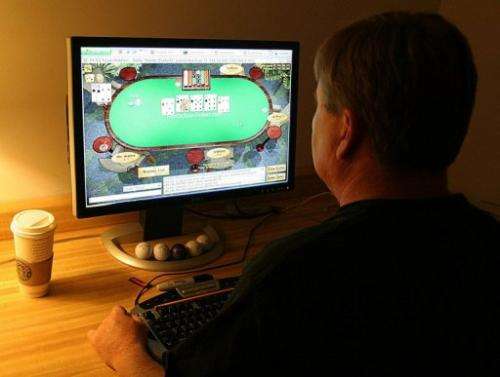US lawmakers shuffle the deck on online gambling

Online gambling is back before Congress, and some are betting it will move forward this time.
Congress has swung into action this year after moves by states to set up their own Internet wagering systems.
At least two bills to regulate Internet gambling have been introduced in the House of Representatives, and a Senate committee has scheduled a hearing on Wednesday on the matter.
After years of treating online gambling as criminal, the US government quietly shifted its stand in late 2011 when the Justice Department released an opinion stating that only sports betting should be prohibited under a 1961 federal law known as the Wire Act.
This opens the door to online poker, which is hugely popular on the Internet, and possibly other casino games along with state lotteries, say analysts.
Nevada opened Internet wagering earlier this year, and New Jersey and Delaware have both passed legislation to authorize it.
"The challenge we've seen is that we are already starting to have a patchwork of inconsistent rules in different states," said Michael Waxman, spokesman for the Safe and Secure Internet Gambling Initiative, a group pressing for regulation of online wagering.
Waxman said the prospects for congressional action are now better than at any time, and "we're down to the decision over whether Internet gambling activity is going to be regulated on a state-by-state basis or by the federal government."
Representative Joe Barton has introduced a measure to legalize online poker, and Representative Peter King last month proposed a broader bill to set up a federal regulatory system for online gaming.
Waxman said Barton's bill is more narrow, and he expressed concern over prohibitions that would ban credit card transactions and prohibit non-casino operators like Zynga or Yahoo! from taking bets online.
"There's no logic behind the argument that it should be permissible for Americans to play poker and bet on horses online, but can't play bingo online as well," said Waxman.
Senator Jay Rockefeller, whose subcommittee holds a hearing Wednesday on online gambling, said lawmakers need to examine the implications of the growth of online wagering.
"Internet gambling is a multi-billion dollar industry that comes with some serious risks, including the potential for money laundering used for terrorist financing. This alone demands that we take a hard look at what a growing Internet gambling industry means as more states have recent laws permitting online wagering," said Rockefeller.
"We've also got to take a hard look at consumer protections, and how we're going to fix any existing gaps that allow underage gambling or otherwise leave consumers vulnerable to fraud and abuse."
The Poker Players Alliance, which endorsed the Barton proposal, said regulation would be beneficial.
"We are all better served through licensing and regulation that implements high standards to protect consumers, thwart fraud and abuse, and guarantee the proper safeguards against underage and addictive gambling," said Alfonse D'Amato, a former senator who chairs the alliance.
The brick-and-mortar casino industry's chief lobby group has supported online poker but its members have been divided on the broader question of online gambling, which could mean less visitors to casinos.
The American Gaming Association in a statement it was "pleased that Representative Barton continues to understand and support the pressing need for a federal legislative solution that would allow for legal, regulated online poker in this country, while still providing the necessary framework for consistent consumer protection safeguards and effective tools to combat illegal Internet gambling."
But at least one major casino mogul, Sands owner Sheldon Adelson, has been opposing legalization of online gambling.
"I'm a father, grandfather... I do not want my children to have the opportunity to become addicted to gaming. And poker, in my opinion, would become one of the most addictive games," Adelson told Bloomberg television recently.
Adelson's group is funding a website stopinternetgambling.com, which urges the defeat of any online gambling legalization.
"Is it worth the societal and economic risk to produce more revenue for the government? Internet gambling advocates fail to mention the fact that Internet gambling by definition will do away with tens of thousands of casino-based jobs and will take us down a slippery path from which we will never be able to turn back," a statement on the website said.
Adelson's comments set a fire in the gaming community, with some calling him hypocritical.
"Adelson made his fortunes though gambling," said Hartley Henderson at the Offshore Gaming Association.
"So why in the world would a casino mogul be opposed to online gambling?"
© 2013 AFP
















